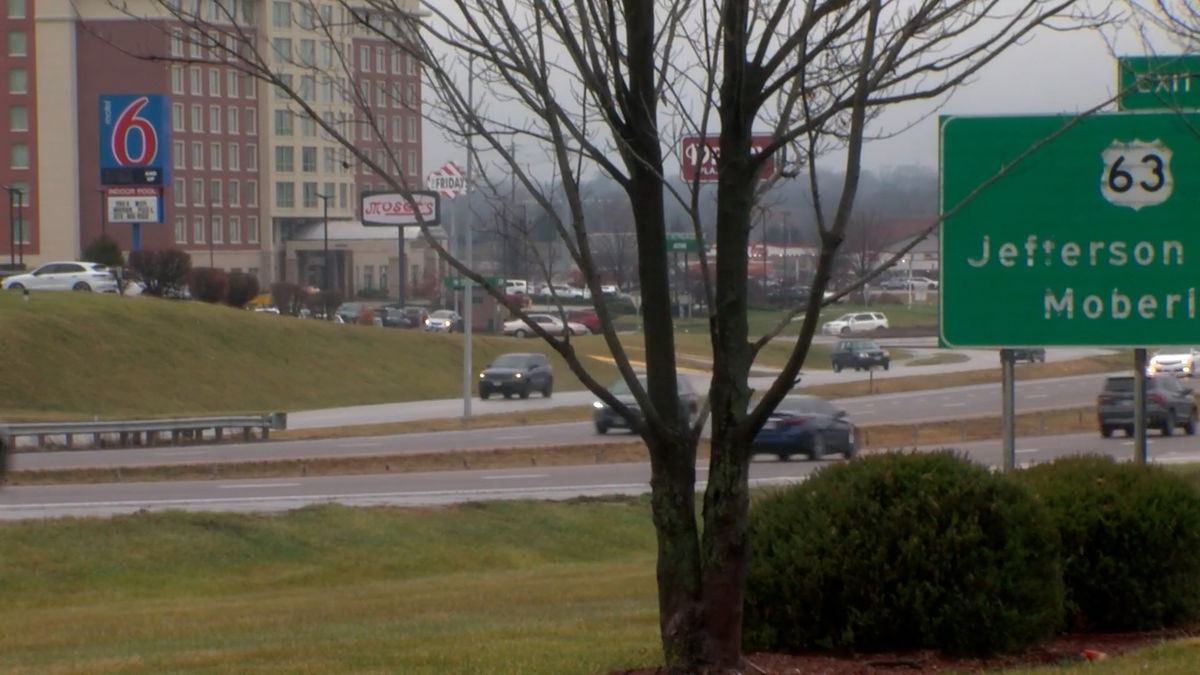Travel
Michael Felker Says It’s Okay To Shake Your Fist At The Clouds After Watching His Knotty Time Travel Flick ‘Things Will Be Different’

Adam David Thompson and Riley Dandy in THINGS WILL BE DIFFERENT, a Magnet release.
If you thought time travel was a confusing concept before now, just wait until you’ve seen Things Will be Different (now playing). An audacious and poignant directorial debut from Michael Felker, the slow burn sci-fi thriller seeks to bend not only your mind, but also the rules of time travel itself.
“The time travel genre is a mine that has been not picked at enough,” Felker, who cut his cinematic teeth editing films for Justin Benson and Aaron Moorhead, declares over Zoom. “Coming in as an editor who views a lot of movies non-linearly and has to put them together linearly, I’m already thinking about time travel and ways in which time travel has not been exploited or dug into in the film space.”
Redolent of Reservoir Dogs, The Lake House, Looper, and Tenet — all while managing to be its own genre animal — Things Will Be Different centers around a pair of estranged siblings, Joseph (Adam David Thompson) and Sidney (Riley Dandy), who hide out from the law in an abandoned farmhouse following a close-call robbery. This remote refuge isn’t just some out of the way hidey-hole, it actually has the power to transport anyone standing inside it to another point in time. In other words, it’s the perfect place for a criminal to lie low until the heat dies down. But as our characters soon learn, no amount of stolen cash is worth messing with the fabric of the space-time continuum.
That’s about as much as I can say without going into heavy spoiler territory and besides, a mere text-based synopsis doesn’t do the labyrinthine film — which invites mandatory repeat viewings — justice. If you’ve already seen it, and want answers (sort of), take a peek below for a spoiler-heavy chat with Mr. Felker…
***WARNING! The following interview contains certain plot spoilers for Things Will Be Different!***
Josh Weiss: I’m still trying to figure this movie out. Where in the world did the idea come from?
Michael Felker: It came from me growing up watching science fiction movies with my family, specifically my dad, who is an engineer and just tends to love science fiction stories, books, movies, what have you. He raised me on movies like Aliens and Blade Runner. The movie that got me into making movies was The Matrix. I wanted to make a movie for [my dad]. Every time we watched one of those movies, he would take us to a diner or fast food joint in Alabama, and we would just talk about it for a long time — the theories the world-building, the lore. I wanted to make a movie for him to talk about it at diners afterwards with other people.
Weiss: What did your dad think after seeing it?
Felker: [laughs] He loved it. He’s now seen it five or six times. He saw an early cut, basically had no notes, and then he’s been at a few of the film festivals, just sitting in the back, watching it. He’s really enjoyed it.
Weiss: To me, this almost felt like a more intimate corner of Christopher Nolan’s Tenet universe — at least in terms of the novel way you treat time travel. What are some of your favorite time travel movies?
Felker: I love the traditional crowd-pleasing ones like Back to the Future and Back to the Future Part II. Specifically, I love time travel movies where fate has been predetermined like 12 Monkeys. I also love some of the rules that are in [movies] like Bill and Ted’s Excellent Adventure, where they’re trying to get ahead on the next loop [with] the prison outbreak later in the movie. There’s a lot of fascinating time travel movies that I love. One of the big inspirations for this one is Timecrimes, which I think is one of the best time travel movies of any scale or size in the last 20 years.
Weiss: Rules of time travel can be tricky. How difficult was it coming up with them while writing the script?
Felker: I had the rules and the world for this movie, but couldn’t quite crack the story for a long time. I love when a movie challenges me and asks me to engage with it a bunch. It allows me to not really throw it away so easily after watching it; it allows me to think about it quite a bit. So, my confidence in the world of rule-building allowed me to shape the story, where we know as much as our characters do. They get wind of this time travel house that allows them to hide out, but they don’t really take the care to understand the intricacies. They just kind of abuse the house, and then they’re like, ‘I think I have a theory,’ but then that leads to ten more questions. I wanted the audience to engage with it as much as possible, or just shake their fists at the clouds, so-to-speak. [laughs]
Weiss: The film opens and ends with “Too Late to Turn Back Now” by Cornelius Brothers & Sister Rose, which is one of my favorite songs. Why that track in particular?
Felker: Simple. It’s one of my favorite songs, too. I used it once for a film school short that I don’t think will ever see the light of day. But it’s such a great, pulpy song. It reminds you of a different time, but it feels like an earworm that can last forever. Every time I hear it in a diner or store, it immediately hooks me and makes me think about movies. I just had to get that song any way possible.
Weiss: This movie almost feels like a two-person play. How did you go about casting your lead actors?
Felker: I’ve worked extensively with Rustic Films, who are known for making really good two-hander indie, cosmic/horror/sci-fi movies. They put me in touch with an amazing casting director, Chrissy Fiorilli-Ellington, who helped us find the two right people — Adam David Thompson and Riley Dandy. When we did the casting process … both Adam and Riley were at the top of the list. [Chrissy] knew to pair them both, because they just felt the closest like brother and sister without us having to spell out brother and sister dialogue. I wanted it to feel organic in their chemistry. Not only are they great, but Chrissy putting them together was huge in making this movie work.
Weiss: The backdrop for the story is a house that’s literally stuck in time. What was your vision for such a unique setting in terms of the production design?
Felker: I got this vision in collaboration with Zach [Thomas], our production designer. We both grew up living in older houses. When you live in older houses, especially visiting my family farm as a kid — where that house was in our family for like 200 years — you see all these weird pictures and antiques that make you ‘time travel’ and wonder what it was like in that moment with that piece as it lived in its natural, modern time. That allowed me to unlock the time travel element. Half of the production design was a lot of great stuff that Zach had found and collected as a production designer living in Michigan, near the Grand Rapids area. The other half was actually from [my family’s farmhouse]. The art and the photography were my family’s. A lot of the photography is of relatives from 200 years ago, and the art was done by my grandma, who just passed away this past year. It really helps tie it together emotionally; to meld all of the stuff you see in the house with this time travel world and lore, and give the house an intimate, but otherworldly, feeling.
Weiss: You edited movies for Justin Benson and Aaron Moorhead before making this film. What lessons did you pick up from them?
Felker: I’ve learned so much from them. They were my first job out of film school as a PA, working on their first movie, Resolution. I guess the main thing, now that I’ve worked extensively on making a movie from scratch and bringing it to release, is that making an indie movie is hard. You’re going to trust in a lot of people, but you’re also going to have to deal with stuff every day. They just said, ‘Exercise patience, don’t be an a**hole, don’t be a mean person, and make it as collaborative and inviting as possible.’ It makes making the movie not so stressful. It makes you feel closer with everybody you collaborate with. I’ve taken that to a heart from day one, and it’s proven to be the most valuable lesson I can give to any indie filmmaker.
Michael Felker
Weiss: Did you edit Things Will Be Different as well?
Felker: I co-edited it with my co-editing partner that I’ve worked with on shorts, Rebecca Marquez, who is a fantastic editor. Editing your own movie is incredibly hard, but also creatively limiting. It keeps you too locked into what you thought you wanted to shoot, and doesn’t open you up to the rewriting possibilities that come in post. Rebecca was incredibly valuable in finding new ways to get through scenes, new ways to structure montages, and finding moments that I didn’t even see when I was watching the monitor on set.
Weiss: I need to rewatch the movie because I still have so many questions. I could be wrong, but I think the stranger is Sidney’s daughter and you’ve got this TVA-type organization overseeing the timeline. Do you have answers for everything?
Felker: I absolutely do. My favorite type of sci-fi [films] are the ones that leave you with more questions than answers. Not just about what happens in the movie, but about the great world beyond you and how it makes an audience wrestle with a lot of things that happen in life. But I do have answers. I love when someone gives me a good read or a good take on what they think happens in the movie, because the movie does give some flexibility for the audience to be a little bit of an author. I’ll say everything you’ve said so far has been spot on and there’s also more you could unpack the more you watch it. It is a movie designed to be rewatched. Even the other day, when dad saw it at the Chattanooga Film Festival for the fifth time, he picked up on more things. It’s definitely rewarding for those who keep digging.
Weiss: What fresh elements do you hope Things Will be Different contributes to the time travel genre?
Felker: The time travel genre is a mine that has been not picked at enough. Coming in as an editor who views a lot of movies non-linearly and has to put them together linearly, I’m already thinking about time travel and ways in which time travel has not been exploited or dug into in the film space. My mantra when making movies is always trying to push for things that I’ve never seen before and explore what works, what doesn’t work, and try to get that out there as best as possible. The time travel genre is ripe for a renaissance, and I feel like there’s a generation of filmmakers who can easily crack it just from how much media they’re exposed to; how everything comes to them in a different order or out of order. It can really unlock the brain for new ways of storytelling.
Weiss: Are there more stories you want to tell in this universe?
Felker: Absolutely. Outside some of the other scripts I’m looking into right now, there’s different tangential stories happening in all these different dimensions, different times. There’s a lot of different avenues I want to explore, including with these characters and then other characters who are also exploring this world. It’s a vast universe. I’ve had people ask me, they want to know more about it, and I want to give it to them as fast and as best as possible. So, yes, there’s definitely more.
*This interview was edited for length and clarity*









